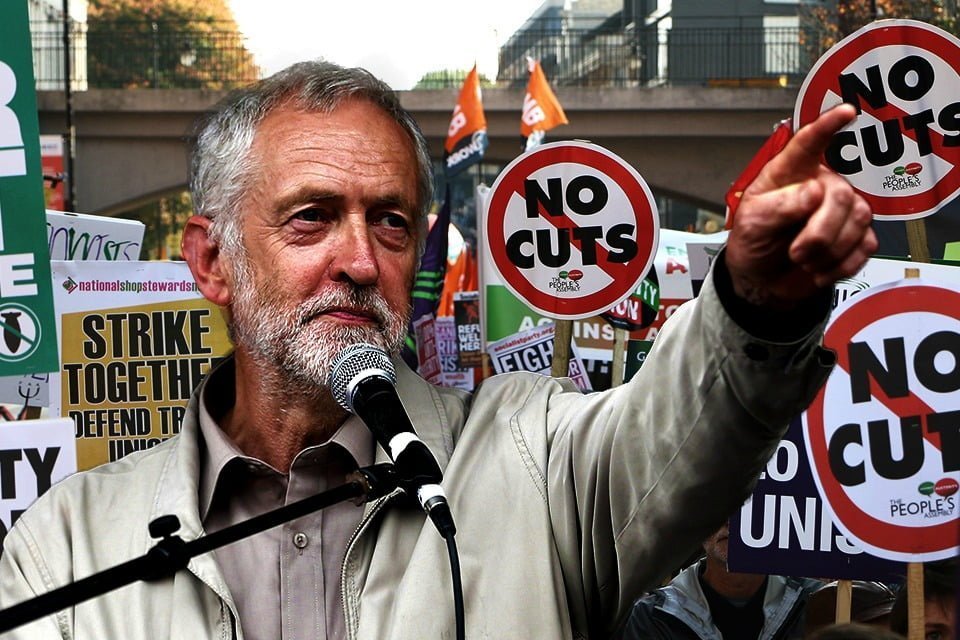The Tory government is drifting from one crisis to another, divided and split. They are only being held together because they fear defeat and the election of a Corbyn-led Labour government. The Labour leaders should go on the offensive and offer an inspiring New Year’s message: to radically transform society with a bold socialist programme.
Damian Green, Britain’s de facto deputy prime minister, has bitten the dust. The former first secretary of state was forced to resign before Christmas after having to accept that he had made “inaccurate and misleading” statements about dodgy photos found on his parliamentary computer.
This is yet another blow to Theresa May’s deeply unstable government. Green’s departure marks the third cabinet sacking within two months.
The uneasy elite
The Tory government is drifting from one crisis to another, divided and split, only being held together because they fear defeat and the election of a Corbyn-led Labour government.
Nevertheless, the end cannot be far away. This prospect will give heart to the millions of people facing an uncertain 2018; those who are increasingly looking to a Labour victory, which looks more and more likely.
The billionaires, however, are getting nervous. “With Theresa May’s grip on power looking ever more vulnerable, business leaders are starting to realise they need to take the prospect of a ‘hard left’ UK government seriously,” warns the paper of big business, the Financial Times. (7/12/17)
“The rise of Jeremy Corbyn has not made me feel that relaxed,” said Edi Truell, a private equity investor who has already taken his entire £250m family fortune out of the UK and moved it to Switzerland. “I would be devastated if he got into power. It would be disastrous…I’ve heard from investors who say ‘we don’t want to invest in the UK, not because of Brexit but because of Corbyn’,” Truell adds.
A Labour government under Jeremy Corbyn would be a “nightmarish” prospect for the business world, the outgoing head of the Engineering Employers’ Federation, Terry Scuoler, has warned. “There are a number of policy initiatives which are likely to be the thin end of a hardline socialist wedge,” he says.
McDonnell’s ‘tea offensive’
 The shadow chancellor, John McDonnell, and other leading figures in the Corbyn movement, however, are attempting to quell the fears of the bosses and bankers. But such attempts to appease big business are misguided. As the Bible says, you cannot serve two masters. The interests of the working class and the capitalists are incompatible. Capitalism wants the working class to pay for the crisis, not the rich and powerful who caused it.
The shadow chancellor, John McDonnell, and other leading figures in the Corbyn movement, however, are attempting to quell the fears of the bosses and bankers. But such attempts to appease big business are misguided. As the Bible says, you cannot serve two masters. The interests of the working class and the capitalists are incompatible. Capitalism wants the working class to pay for the crisis, not the rich and powerful who caused it.
From day one, big business will attempt to sabotage a Corbyn government. We have already heard the threats from the army generals, as well as the bankers and corporate elites. Their message has been all too clear.
After Corbyn became Labour leader, John McDonnell surrounded himself with an advisory panel of Keynesian economists, including Ann Pettifor and David Blanchflower. Several quit in the wake of the EU referendum result and the subsequent attempt to remove Corbyn, leaving just Pettifor, who now predicts that a Corbyn government would be good for business because it would be “economically expansionary”. She suggests that the Labour leadership will ultimately turn out to be pragmatic. “You just have to look at past Labour governments. The party is prepared to work with business and the City of London.”
“Business leaders know their biggest problem is spare capacity and a shortage of customers coming through the door. That is why they have been willing to listen to the shadow chancellor’s ‘tea offensive’ and that is why they will ignore the Daily Mail’s Pavlovian howling,” states Ms Pettifor.
This is a very naive view. Firstly, every attempt by a Labour government to manage capitalism has ended in tears. They simply tinkered with the capitalist system but failed to change it. The problem of capitalism is not simply “demand”, as the Keynesians say, but profitable markets, which they fail to address. Capitalism is not a system based upon production for need but production for profit. It is the desire for profits that determines whether and where capitalists produce or invest. To increase their profits further will require yet more attacks on the working class, as profit comes from their unpaid labour.
Bring back Clause IV!
 At the same time, the system is in a deep crisis and can no longer afford reforms as in the past. In a new review of leading UK economists, a majority expect the British economy to slow down again this year, with household debt growing and wages only rising slightly, well below inflation. The sharp rise in rail fares this month will not have helped in getting people to accept the Tory lies about things getting better.
At the same time, the system is in a deep crisis and can no longer afford reforms as in the past. In a new review of leading UK economists, a majority expect the British economy to slow down again this year, with household debt growing and wages only rising slightly, well below inflation. The sharp rise in rail fares this month will not have helped in getting people to accept the Tory lies about things getting better.
According to Ruth Davidson, the leader of the Scottish Tories: “belief in free enterprise [i.e. capitalism] is corroding, and the illusory promises of socialism once again appeal.” She goes on to quote from the recent survey by Populus for the Legatum Institute, which found that “three-quarters of Britons now favour full nationalisation of the utilities and rail infrastructure.” “Asked to describe capitalism,” the survey noted, “people view it as ‘selfish’, ‘greedy’ and ‘corrupt’.”
Labour should base itself on these facts and, when in power, take complete control of the economy. Under capitalism, it is the economy that dictates to government and not the government that dictates to the economy. At the end of the day, you cannot plan what you do not control and you do not control what you do not own.
By taking over the commanding heights of the economy – the giant corporations and banks that dominate our lives – a socialist Labour government could plan in the interests of the working class not the billionaire class. Such a socialist plan would be run under democratic workers’ control and management, working to build the homes, hospitals, and schools that we need, and to raise our living standards, ending poverty and exploitation.
This year is the centenary of the adoption of Clause IV, the Labour Party’s commitment to socialism, which was later scrapped by Tony Blair. This Clause promised to “secure for the workers by hand or by brain the full fruits of their industry, based upon the common ownership of the means of production, distribution and exchange.” This is what a Labour government should be offering, not a patched up version of the bankrupt capitalist system, where the rich get richer.
Labour must bring back Clause IV – and this time implement it. This must be our New Year’s resolution for 2018.






